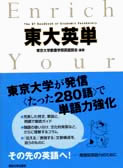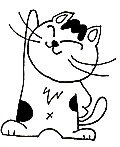The University of Tokyo Handbook of Academic Vocabulary (Tōdai Eitan) published

March 2009 saw the publication by the University of Tokyo Press of The University of Tokyo Handbook of Academic Vocabulary (Japanese title: Tōdai Eitan). Written and edited by the Department of English Language in the University’s College of Arts and Sciences, the book grew out of an in-house vocabulary textbook that had been developed to meet the specific abilities and needs of first- and second-year UT undergraduates. In its new commercial version, Tōdai Eitan is intended to boost vocabulary skills and thereby enhance the overall English ability of an even wider readership.
The Road to Publication
When a new undergraduate English curriculum was being conceived at UT for adoption in April 2006, a proposal was made to supplement the curriculum’s required reading course with an original vocabulary textbook. A team of faculty members met thereafter once a week to write a vocabulary text based on words taken from On Campus, the textbook used in the summer semester of the first-year English I course. A preliminary draft of the vocabulary book was described at a public symposium held by the Department of English Language in May 2007, and in April 2008 an in-house version titled A Handbook of Academic Vocabulary (HAVOC) and based on the first eleven of On Campus’s fourteen chapters was published. Adopted in many English classes for first- and second-year students, HAVOC was warmly received in the classroom, and constructive suggestions from both students and teachers led to many improvements in the text. This enthusiastic cooperation between faculty and students enabled the essence of English education on UT’s Komaba Campus to be distilled into the unique vocabulary text Tōdai Eitan.
From Thucydides to Obama
Tōdai Eitan’s example sentences and explanations of the 280 headwords range from the humanities to the sciences and mention a huge variety of people and events both ancient and modern and from both East and West. The person mentioned most often in the book is William Shakespeare, but appearances are also made by everyone from the 19th century Japanese royalist Sakamoto Ryōma to the Austrian philosopher Otto Neurath and the Prague-born biochemist Gerty Cori. The historical scope extends from the Mayan calendar and the Treaty of Shaoxing to the Heisenberg uncertainty principle, the moon landings, and the inaugural address of Barack Obama. The academic fields represented in the examples cover nearly every subject taught in universities, from literature, history, and international politics to chemistry and mathematics.
One of the chapter-closing articles explains the gender issues involved in English terms for occupations and professional titles, and efforts were made throughout the text to strike a balance between males and females in the example sentences. Though referred to as “she” during the book’s preparation, even the cat character who appears here and there throughout the text dubbed Miyo in Japanese and Meow in English is of unknown gender.
While founded upon the twin pillars of liberal-arts education and an inquisitive, sometimes playful approach to words, Tōdai Eitan is replete with English expressions and information useful not only for writing academic papers but for every area of life in today’s globalized world.
Looking Ahead
With its white cover and blue half-wrapper, Tōdai Eitan set out from the leafy confines of the Komaba Campus on March 23, 2009, to find its way in the wider world. Initial sales were surprisingly brisk in business areas of Tokyo such as Ōtemachi and Ginza, a few weeks later the book became the number-one online best seller in Japan, and in May advertisements were even spotted on the Marunouchi subway line. The book’s immense popularity has been widely reported in the press, with one newspaper even contrasting it with the hit comic Dragon Zakura. No one knows what might lie ahead for Tōdai Eitan, but with the continuing support of many readers and friends we hope for its continued success.

(Written by Masako Notoji. English version by Tom Gally.)

